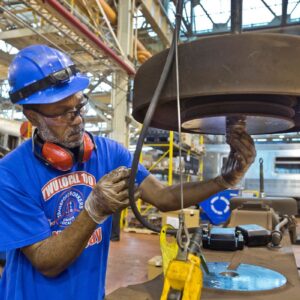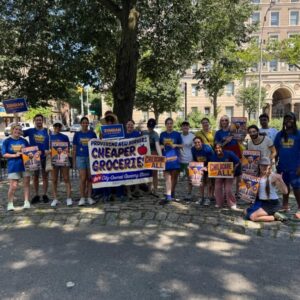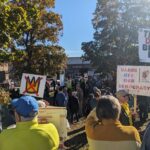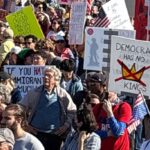
Nearly two million Black families in the US South have zero or negative net worth. More than half of the nation’s Black population (about 56 percent) lives in the South, including those nearly two million families with no monetary wealth. To compound the issue, this summer saw Black women nationally lose 300,000 jobs even as the US economy continues to grow.
In the South, the median White household today holds 24 times more wealth than the median Black household.
These outcomes are reinforced by a hostile political landscape that continually thwarts efforts to achieve greater economic equality for the Black community, as statehouses in the South are rolling back voting rights, censoring history books, and undermining civil rights.
Yet organizations serving Black communities received just 0.6 percent of all charitable giving in 2022 and the entire US South, home to an estimated 39 percent of Americans, receives less than 3 percent of US philanthropic investment.
It’s impossible to ignore numbers like these, especially when one considers how the racial wealth gap manifests in the South. A new report I authored for Kindred Futures, Roots of Wealth: Unearthing Black Prosperity in the South, details that in the South, the median White household today holds 24 times more wealth than the median Black household. In Arkansas, for example, the median White family has about $70,000 in wealth, 35 times more than the $2,000 of the median Black family.
These divides aren’t about individual life decisions; they result from structural barriers and deliberate policy choices. Chronic neglect by major funders and institutions isn’t just a statistical quirk; it has real consequences. In the face of rising autocracy and continual systemic injustice, this lack of investment is both amoral and a strategic failure.
Turning this around will require both a clear strategy and the will to act. It also requires understanding the context of the South. If, as Jasmine Banks and April Doner wrote in NPQ earlier this year, “As goes the South, so goes the nation,” we best get moving.
The Roots of Inequality
I was born and raised in Mobile, AL, and my paternal family descends from nearby Africatown, a place founded by survivors of the last known slave ship to the United States, the Clotilda, which arrived on our shores in 1860. This isn’t distant history; it lives in the stories passed down in my family. The last survivor of that ship, Cudjo Lewis, died in 1935 at age 94, making it chillingly clear that we are only a generation or two removed from slavery’s living memory.
Walk through the South and you’ll find the past etched into the landscape. As a child in Mobile, I could see where history hadn’t even tried to hide: Antebellum plantations still stand, their grand oak-lined avenues and big houses preserved as museums or wedding venues, even as the slave quarters crumble behind them. In town squares and at courthouses, Confederate monuments cast long shadows as bronze and marble homages to those who fought to keep my ancestors in chains. Stone Mountain, GA, for instance, still hosts a carving on a rock face of three Confederate figures—the largest high-relief sculpture in the world—which is just one of countless Confederate memorials that remain on public land across the country. The very presence of these sites and symbols underscores how slavery’s legacy isn’t just taught in textbooks; it is quite literally built into the Southern landscape, a daily reminder that our region was ground zero for an economy that commodified Black people.
Building Black wealth…requires rewriting the policies, redirecting the investments, and rebuilding the institutions that determine who can own.
The wealth generated by enslaved Black labor flowed through every vein of the American economy. In fact, by 1860 the economic value of enslaved African Americans exceeded the combined value of all US railroads, factories, and banks.
Think about that: Millions of Black men, women, and children were literally counted as capital assets worth more than the country’s entire industrial infrastructure. Our bodies were collateral for an economic system that built the United States into a global power. Southern elites knew it and so did Northern financiers who traded in slave-produced commodities and insured slave property. Simply put, US capitalism was nourished on the sweat, blood, and stolen lives of Black people.
Revenue, Resilience, Repair: A New Vision for Black Wealth
In response to this urgent moment, Southern grassroots organizations have come together to launch the Roots of Wealth Coalition Network. The network is a regional alliance focused on building Black wealth through movement building and policy change. This requires rewriting the policies, redirecting the investments, and rebuilding the institutions that determine who can own land, buy a home, start a business, or simply inherit opportunity in the South.
Of course, network members recognize the severe political obstacles we face. Still, in the belief that power concedes nothing without a demand, the network has developed an ambitious long-term agenda, some key pillars of which are the following:
- Invest in Children’s Futures
One of the boldest ideas gaining traction is the creation of “baby bonds.” Under a baby bonds program, every child receives a trust account at birth (with larger public contributions for lower-wealth families) that grows over time and can be used in young adulthood for wealth-building purposes like buying a home or starting a business.
Analysis by the Center for American Progress found that a nationwide baby bonds policy could dramatically shrink the White-Black wealth divide by reducing the wealth ratio from six-to-one today to less than two-to-one by 2060. Several Southern states—including Georgia, Louisiana, and North Carolina—have already seen baby bond legislation introduced.
- Boost Black Homeownership
Since owning a home is one of the primary ways Americans build wealth, increasing Black homeownership in the South is critical. This requires aggressive steps, including providing down payment assistance for first-generation homebuyers, a disproportionate share of whom are Black.
This also requires enforcing fair lending laws and cracking down on bias in mortgage underwriting, and tackling appraisal discrimination that undervalues homes in Black neighborhoods. It also means expanding affordable housing (for instance, through inclusionary zoning and community land trusts) and protecting Black homeowners from predatory practices like contract-for-deed scams and from tax foreclosures on heirs’ property.
- Strengthen Financial Inclusion
Building wealth requires access to fair financial services. Southern Black communities have been systematically underbanked and overexposed to predatory lending. Strengthening community-based financial institutions is key. This includes supporting community development financial institutions (CDFIs) and Black-owned banks and credit unions. States can partner with these institutions by depositing public funds or offering loan guarantees to encourage more small-dollar lending.
At the same time, lawmakers must crack down on predatory lending that strips wealth by capping interest rates on payday and title loans. Stronger regulation of installment lenders and rent-to-own schemes can prevent exploitative debt cycles. Another piece of the puzzle is supportive tax policy. Expanding refundable tax credits (state-level Earned Income Tax Credits, childcare credits, and the like) puts money back in the pockets of low- and middle-income Black families, enabling them to save and build assets.
- Raise Worker Income
Income from work may not guarantee wealth, but it’s a necessary foundation. Many Black workers in the South are stuck in low-wage jobs due to policy choices. Raising the wage floor and boosting worker power can have a transformative effect. Several Southern states still cling to the federal minimum wage of $7.25. If minimum wages were increased to $15 (even gradually), it would increase Black workers’ earnings by billions of dollars and significantly reduce poverty rates across the South.
Beyond wages, support for unions can directly contribute to wealth building. Union membership has a proven wealth dividend: The median wealth for a union household is roughly 1.7 times that of a similar nonunion household, with the largest gains accruing to workers of color.
- Fuel Black Business Ownership
Business ownership is a major avenue to wealth creation. Here, too, targeted investment and policy support can help. States can establish dedicated funds or low-interest loan programs for Black small businesses. Partnering with CDFIs to administer these funds can leverage community knowledge to get capital to where it’s needed most.
In addition, community wealth-building models deserve support. Efforts like Cooperation Jackson in Jackson, MS, and The People’s Community Land Trust in Atlanta, GA, offer meaningful examples. Supporting Black farmers in reclaiming and retaining land is another critical strategy: This means funding legal aid to clear titles on heirs’ property, enforcing debt relief for farmers of color, and helping a new generation of Black farmers acquire land.
- Embrace Reparations
Finally, truly closing a wealth divide centuries in the making will require bold, reparative public policies. Following the lead of localities like Evanston, IL, which pioneered a housing reparations program funded by a tax on marijuana sales, Southern cities can design their own initiatives to invest directly in Black wealth building. This could include everything from direct compensation or trust funds for descendants of those who suffered specific historical injustices, to ambitious debt relief programs (such as buying and paying off medical debt and canceling student debt) that disproportionately burden Black families.
None of these economic changes will happen, of course, without building political power. Protecting voting rights and ending voter suppression in the South is fundamental to any wealth agenda.
Picture a South where Black children inherit opportunity and hope.…Building that future will require not just policy reform, but genuine transformation.
A Call to Action
The vision emerging from these efforts is as urgent as it is hopeful. It imagines a Southern economy where thriving Black communities are the engine of shared prosperity, where wealth is measured beyond dollars—in security, dignity, and self-determination.
Picture a South where Black children inherit opportunity and hope, not debt and disadvantage. Building that future will require not just policy reform, but genuine transformation.
Our movement’s task today is to nourish the roots of wealth with investment, with fair policies, with education, with love, and with justice.
Across the South, Black-led organizations are doing exactly that. The road ahead isn’t easy. But I truly believe we are on the cusp of a Southern renaissance where Black communities thrive not despite the region, but because of it.














